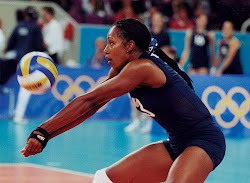
Anyone who watches "Bones" regularly was thrilled to see our favorite sport highlighted on last week's episode! (Even if it was in a slightly twisted kind of way.) The show made an excellent point, however, that all volleyball players should be aware of. The young woman in question had sustained multiple injuries as a result of her time spent on the team. Injuries like jumper's knee are common when you hit the courts, and it's something that you as a player should be aware of-and take steps to prevent.
What is Jumper's Knee?
Jumper's Knee, also known as patellar tendonitis, involves the patellar tendon that joins the kneecap to your shin bone. This tendon is extremely important when you're out on the courts-it's the tendon that lets your quads actively straighten the knee, propelling you upward and putting you in position for that perfect spite. As an athlete you put this tendon under a lot of stress. That stress that can cause micro-tears and collagen degeneration.
Symptoms of Jumper's Knee present as pain at the bottom and front of the kneecap, aching/stiffness after practice and pain when you flex your quads. Honestly, it probably won't seem like a very big deal; however, ignoring it can lead to chronic pain, difficult treatments and, in some cases, surgical intervention.
What Can You Do About It?
The best defense is a good offense. Building your leg's strength and flexibility will help you avoid contracting Jumper's Knee in the first place-but do it gradually. Much like shin splints, Jumper's Knee is often the result of overconditioning. Rest regularly, and unless you're in peak shape don't exercise more than four times a week.
If you do begin to feel the niggling pain of Jumper's Knee, contact your physician immediately. At the beginning it can usually be treated with anti-inflammatories, ice massage and physical therapy, a knee sleeve and proper training. More severe cases may graduate to injection of steroids, long-term rest (i.e. at least a season off the court) and, potentially, corrective surgery.
Jumper's Knee isn't a pleasant condition, but proper prevention and management can ensure that it remains a glitch in your game rather than a complete show-stopper.
Come check out our extensive collection of training materials and equipment at http://www.volleyballproshop.com/.
What is Jumper's Knee?
Jumper's Knee, also known as patellar tendonitis, involves the patellar tendon that joins the kneecap to your shin bone. This tendon is extremely important when you're out on the courts-it's the tendon that lets your quads actively straighten the knee, propelling you upward and putting you in position for that perfect spite. As an athlete you put this tendon under a lot of stress. That stress that can cause micro-tears and collagen degeneration.
Symptoms of Jumper's Knee present as pain at the bottom and front of the kneecap, aching/stiffness after practice and pain when you flex your quads. Honestly, it probably won't seem like a very big deal; however, ignoring it can lead to chronic pain, difficult treatments and, in some cases, surgical intervention.
What Can You Do About It?
The best defense is a good offense. Building your leg's strength and flexibility will help you avoid contracting Jumper's Knee in the first place-but do it gradually. Much like shin splints, Jumper's Knee is often the result of overconditioning. Rest regularly, and unless you're in peak shape don't exercise more than four times a week.
If you do begin to feel the niggling pain of Jumper's Knee, contact your physician immediately. At the beginning it can usually be treated with anti-inflammatories, ice massage and physical therapy, a knee sleeve and proper training. More severe cases may graduate to injection of steroids, long-term rest (i.e. at least a season off the court) and, potentially, corrective surgery.
Jumper's Knee isn't a pleasant condition, but proper prevention and management can ensure that it remains a glitch in your game rather than a complete show-stopper.
Come check out our extensive collection of training materials and equipment at http://www.volleyballproshop.com/.



No comments:
Post a Comment